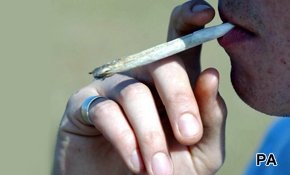79% Brits say sale & possession of hard drugs should remain crime; 49% say same for 'soft' drugs
The sale and possession of hard drugs like heroin and cocaine should remain a criminal offence, say over three quarters of the British public, while just under one in ten (9%) say that the sale and possession should be decriminalised, our poll has found.
When it comes to softer drugs such as cannabis, however, around half the population (49%) thinks sale and possession should remain a criminal offence.
- 79% say the sale and possession of hard drugs such as heroin and cocaine should remain a criminal offence , versus 9% who say the sale and possession of hard drugs should be legalised
- 6% say the sale and possession of hard drugs should remain illegal but be decriminalised in a way that it would be regarded as a minor offence, such as parking in the wrong place, rather than a major offence
When it comes to 'softer' drugs, opinion is similar but not as strong, with just under half (49%) saying the sale and possession of drugs like cannabis should remain an offence, and a quarter (25%) saying it should be decriminalised. One in five think soft drugs should be legalised completely.
Fewer drug users?
It seems that a slim majority (51%) of Britons feel that were hard drugs to be decriminalised, more people would do drugs – however, almost a third (31%) think it would make no difference. Just 5% think it would lead to fewer people doing drugs.
If soft drugs like cannabis were decriminalised, however, the balance shifts slightly, with just under half (48%) saying there would be more people using drugs, and over a third (36%) saying decriminalising drugs such as cannabis would make no difference. 8% think that decriminalising 'soft' drugs would lead to fewer drug users.
Following the Portuguese example
In an attempt to find a new approach for the 'war on drugs', earlier this year, British officials began examining the Portuguese anti-drugs programme which, as of 2001, decriminalised possession of drugs as a means of tackling high rates of drug addiction and HIV among drug users.
Over half of Britons say they would support limited trials of the Portuguese approach in some British cities, while two fifths say they would support the introduction of a similar approach across the entire country.
- 60% would support limited trials of the Portuguese approach in some British cities, while 24% would oppose this, and 16% remain unsure
- 46% say they would support a similar programme in the country as a whole, 32% say they would oppose this, while 23% don’t know
In Portugal, people who grow, deal or traffick drugs are still prosecuted, but possession of drugs for personal use has been decriminalised. As a result, there has been increased investment in drug treatment programmes and harm reduction programmes.
The results of a report commissioned in 2006 by the Cato Institute suggest that in the five years after personal possession was decriminalised, illegal drug use among teens in Portugal declined along with HIV infections, while the number of people seeking treatment for drug addiction more than doubled.
Some experts remain sceptical however, noting that Portugal is a small country and that the 'cyclical nature' of drug epidemics may account for the declines in heroin use and deaths.









